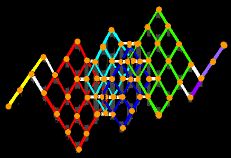 where:
where:Some people (such as Sean of the Cosmic Variance blog) attack all religion, saying:
On the other hand, religion seems to be important to many people. For example, the elected representatives of the citizens of the USA (435 members of the House of Representatives and 100 Senators of the 110th Congress being sworn in on 4 Jan 2007), a CNN web page (Reuters article) at http://www.cnn.com/2007/POLITICS/01/03/congress.religion.reut/ gives their stated religious affiliations as: "…
Einstein (in the New York Times Magazine on November 9, 1930 pp 1-4) described Three Stages of Human Religion:
"... what are the feelings and needs that have led men to religious thought and belief in the widest sense of the words? [Stage 1 - Religion of Fear]... With primitive man it is above all fear that evokes religious notions - fear of hunger, wild beasts, sickness, death. Since at this stage of existence understanding of causal connections is usually poorly developed, the human mind creates illusory beings more or less analogous to itself on whose wills and actions these fearful happenings depend. Thus one tries to secure the favor of these beings by carrying out actions and offering sacrifices which, according to the tradition handed down from generation to generation, propitiate them or make them well disposed toward a mortal. In this sense I am speaking of a religion of fear ... stabilized by the formation of a special priestly caste which sets itself up as a mediator between the people and the beings they fear, and erects a hegemony on this basis.
[Stage 2 - Religion of Morals]... The desire for guidance, love, and support prompts men to form the social or moral conception of God. This is the God of Providence, who protects, disposes, rewards, and punishes; the God who, according to the limits of the believer's outlook, loves and cherishes the life of the tribe or of the human race, or even or life itself; the comforter in sorrow and unsatisfied longing; he who preserves the souls of the dead. This is the social or moral conception of God. ... In general, only individuals of exceptional endowments, and exceptionally high-minded communities, rise to any considerable extent above this level.
[Stage 3 - Cosmic Religion] But there is a third stage of religious experience ... I shall call it cosmic religious feeling. It is very difficult to elucidate this feeling to anyone who is entirely without it … The individual feels the futility of human desires and aims and the sublimity and marvelous order which reveal themselves both in nature and in the world of thought. Individual existence impresses him as a sort of prison and he wants to experience the universe as a single significant whole.
... all religions are a varying blend ...
The beginnings of cosmic religious feeling already appear at an early stage of development,
e.g., in many of the Psalms of David and in some of the Prophets. Buddhism … contains a much stronger element of this. The religious geniuses of all ages have been distinguished by this kind of religious feeling, which knows no dogma and no God conceived in man's image; so that there can be no church whose central teachings are based on it. … Looked at in this light, men like Democritus, Francis of Assisi, and Spinoza are closely akin to one another. …
In my view, it is the most important function of art and science to awaken this feeling and keep it alive in those who are receptive to it. … I maintain that the cosmic religious feeling is the strongest and noblest motive for scientific research.
Only those who realize the immense efforts and, above all, the devotion without which pioneer work in theoretical science cannot be achieved are able to grasp the strength of the emotion out of which alone such work, remote as it is from the immediate realities of life, can issue.
What a deep conviction of the rationality of the universe and what a yearning to understand … Kepler and Newton must have had to enable them to spend years of solitary labor in disentangling the principles of celestial mechanics!
Those whose acquaintance with scientific research is derived chiefly from its practical results easily develop a completely false notion of the mentality of the men who, surrounded by a skeptical world, have shown the way to kindred spirits scattered wide through the world and through the centuries. …
It is cosmic religious feeling that gives a man such strength. …".
Since Einstein said that the "beginnings" of Stage 3 Cosmic Religion "already appear at an early stage of development" of Human Religion, I will comment on Cosmic Religion aspects of Human Religions starting with very early times
Since Einstein referred to Spinoza as a "religious genius ... distinguished by ... cosmic religious feeling", my comments will come from a Spinoza - Pantheist - Taoist perspective. According to the Stanford Encyclopedia of Philosophy:
"… A defining feature of pantheism is allegedly that God is wholly immanent … pantheism denies the theistic view that God transcends the world …the most complete attempt at explaining and defending pantheism from a philosophical perspective is Spinoza's Ethic …
philosophical Taoism is one of the best articulated and thoroughly pantheistic positions there is …".
So that I can discuss how such religion fits together with science, here is an outline of how I see science, taken from comments (by NC and B. and Count Iblis and me) on the Cosmic Variance blog:
NC said: "… the idea that genes drive evolution … is stopping off at an arbitrary point in the long chain of causality. The only scientific thing … to do, … searching for ultimate causes, is to not stop at genes but go on a step and tell us about how 'selfish background radiation' drives evolution …".
I said: "... Once background radiation is brought into play, from a pantheistic view, you get to Dave Rothstein's possibility of "God intervening every time a [quantum event] measurement occurs". ...".
B. said: "… Instead of asking where the universe comes from, ask where the natural numbers 'come from'. ... Is maths the foundation for the theory of everything? …".
Count Iblis said: "… That's a good question and that has lead some people to postulate that reality is purely mathematical in nature. … You can define them [the natural numbers] recursively:
B. said: "… in the end you'll sit in this field of complex numbers, and every one of them is just a point in a plane. Does C have a cause? …".
I said: "... If you want to continue the process, you might note that
So, my picture of science is very much like my physics model based on real Clifford algebras, which can be described (due to periodicity-8) in terms of the 2^8 = 256-dimensional Clifford algebra Cl(8).
1 - IFA: Since humans seem to have come out of Africa, the first Religion I will mention is IFA, also known as VoDou. Western views of IFA often emphasize Stage 1 - Fear Religion aspects (casting spells etc), but the IFA divination system has an important Stage 3 - Cosmic Religion aspect: It is based on a 2^8 = 256 element structure that leads us to the 2^8 = 256-dimensional Clifford algebra Cl(8).
2- Rig Veda: According to The Constitution of the Universe by Maharishi Mahesh Yogi "... The knowledge of the total Ved ... is contained in the first sukt of the Rik Ved ... the eight syllables of the first pad ... provide... a further commentary on ... the first syllable of Rik Ved, 'AK'. These eight syllables correspond to the ... eight fundamental qualities of intelligence ... The first line, or 'richa', of the first sukt, comprising 24 syllables, provides a further commentary on the first pad (phrase of eight syllables) ... The subsequent eight lines complete the remainder of the first sukt ... These eight lines consist of 24 padas (phrases), comprising 8x24 = 192 syllables. ... these 192 syllables of ther first sukt (stanza) get elaborated in the 192[?or is it 191?] suktas that comprise the first mandal (circular cyclical eternal structure) of the Rik Ved, which in turn gives rise to the rest of the Ved and the entire Vedic literature. ...".
Since the first richa of the first sukt has 24 syllables plus 24 gaps (if you include a silent gap at the beginning/end to close the first sukt into a circle) and those 24 gaps are made relevant by being elaborated by the following 8 richas of the first sukt, which have 192 syllables, the total number of relevant entities in the first sukt is 24+24+192 = 240, which is the number of vertices of the root vector polytope of the E8 Lie algebra. Since the E8 Lie algebra has rank 8, it has dimension 240+8 = 248, and can be seen as 120-dim Spin(16) adjoint plus 128-dim Spin(8) half-spinors, where Spin(16) is the bivector Lie algebra of the Cl(16) Clifford algebra, and Cl(16) = Cl(8) (x) Cl(8).
In my opinion, the Rig Veda may be the earliest reduction to writing of the original African-based orally transmitted early global wisdom of IFA = VoDou, and, as the earliest, it may be the most nearly complete written description of that wisdom.
3 - Shinto: The Japanese Religion named for the Spirit (Shin) of the Tao (to), whose divination system has 128 elements that call attention to the even half of the 2^8 = 256-dimensional Clifford algebra Cl(8).
4 - Taoism: The Chinese Religion whose I Ching divination system has 64 elements that call attention to the 2^6 = 64-dimensional Cl(6) subalgebra of Cl(8), and in turn call attention to the Spin(2,4) Conformal Group that describes Gravity and the Higgs mechanism. The Clifford graded structure of Cl(6) is 1 + 6 + 15 + 20 + 15 + 6 + 1 based on a 6-dim vector space on which the Conformal Group Spin(2,4) = SU(2,2) acts linearly. However, the Conformal Group also has a non-linear, but physically significant, action on a 4-dimensional vector space corresponding to 4-dimensional physical spacetime which is related to a grading 4 + 16 + 24 + 16 + 4 = 4 + 16 + (12+12) + 16 + 4 which in turn is based on the Lattice I Ching structure of Billy Culver
 where:
where:
5 - Judaism: As Stan Tenen has noted, the 613 Commandments given to Moses, beginning with the first Commandment given in Egypt and ending with the 613th Commandment given 50 days later at Sinai, are divided into 365 negative Commandments and 248 positive Commandments. The 365 correspond to the central number in the 27x27 Magic Square , which corresponds to the 27-dim Jordan algebra J3(O) and the 248 correspond to the 248-dimensional Lie algebra E8 and so to Cl(8) (x) Cl(8).
Urim v'Tumim  is for communication from the Spirit Mind of G-d to Humanity:
is for communication from the Spirit Mind of G-d to Humanity:
6 - Stoicism: Marcus Aurelius (121-180 AD) said:
7 - Christianity: According to the Stanford Encyclopedia of Philosophy: "… Philosophical Taoism is the most pantheistic, but Advaita Vedanta, certain forms of Buddhism and some mystical strands in monotheistic traditions are also pantheistic. … Pantheism... is antithetical to any power structure; the kind, for example, found in the Catholic church. ...". Some "mystical strands" of pantheism in Christianity have been excluded from doctrine of some power-structure Christian churches. For example:
According to the Catholic Encyclopedia: "... Raymond Lully... RAMON LULL ... "Doctor Illuminatus", philosopher, poet, and theologian, b. at Palma in Majorca, between 1232 and 1236; d. at Tunis, 29 June, 1315. Probably a courtier at the court of King James of Aragon until thirty years of age, he then became a hermit and afterwards a tertiary of the Order of St. Francis. ... he strove to ... expound Christian theology in such a manner that the Saracens themselves could not fail to see the truth ... he invented a mechanical contrivance, a logical machine, in which ... causing a wheel to revolve, the propositions would arrange themselves in the affirmative or negative and thus prove themselves to be true. This device he called the Ars Generalis Ultima or the Ars Magna, and to the description and explanation of it he devoted his most important works. Underlying this scheme was a theoretical philosophy, or rather a theosophy, for the essential element in Raymond's method was the identification of theology with philosophy. ... He held that there is no distinction between philosophy and theology, between reason and faith, so that even the highest mysteries may be proved by means of logical demonstration and the use of the Ars Magna. This of course removed all distinction between natural and supernatural truth. ... The Church authorities, however, recognized the dangerous consequences which follow from the breaking down of the distinction between natural and supernatural truth. Consequently, in spite of his praiseworthy zeal and his crown of martyrdom, Raymond has not been canonized. His rationalistic mysticism was formally condemned by Gregory XI in 1376 ...".According to a 1973 article, "Ten Men of the Church before 1500", by Bob Sander-Cederlof: "... Lull was himself a layman, was never ordained, and never became a monk. This certainly contrasted to the priestcraft of Catholicism ...[ another ]... significant contrast was Lull's desire to evangelize the Moslems rather than to conquer them by force. He abhorred the Crusades, and urged the church to begin a crusade of love. ...". According to Stephen Skinner's book "Terrestrial Astrology - Divination by Geomancy" (Routledge and Kegan Paul 1980): "... many of Ramon Lull's wheels ... look like geomantic wheels [LoPan] ...
[ wheel A
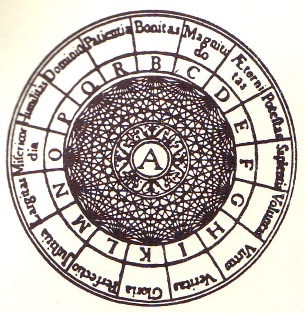
is ]... divided into 16 chambers ... 120 more "chambers" were formed by combining pairs ...
[Note that the 120 correspond to the adjoint part of E8, and to the 120 bivectors of Cl(16) which by real Clifford 8-periodicity is equal to Cl(8) (x) Cl(8).Which of the 120 Spin(16) bivectors ( that act on the 16-dim vector space of Cl(16) ) act naturally on the 8-dim vector spaces ( that are subspaces of the Cl(16) vector space ) of each of the 2 copies of Cl(8), and which of them have actions that go beyond those subspaces ?
Since (N+N) /\ (N+N) = (N+N) ( (N+N) -1 ) / 2 = N ( N + (N-1) ) = N^2 + 2 x N/\N and for N = 8 we have 120 = 16 /\ 16 = 64 + 2 x 28 so that:
2 x 28 = 56 of the 120 Cl(16) bivectors act naturally on the 8-dim subspaces, and they correspond to two copies of the 28-dim Spin(8) Lie algebra, as shown by Lull's wheel X. ]
... Another circle ...
[ wheel S
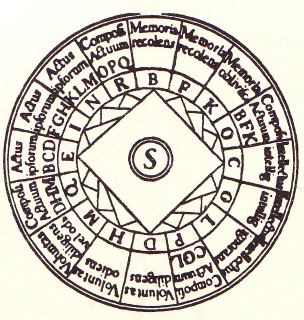
]... shows the rational soul in the center represented by 4 squares and has its circumference divided into 16 compartments ...
[Note that 16 vertices of 4 squares correspond to the 16 vertices of a hypercube inside a 24-cell, and that the 16 of 4 squares times the 16 of the compartments gives the 256 elements of Cl(8).Note also that here the 16-dim vector space of Cl(16) is decomposed into (4+4) + (4+4) so that we have Cl(16) = Spin(4+4) (x) Spin(4+4) and this decomposition is relevant to dimensional reduction of 8-dim spacetime by introducing a preferred 4-dim quaternionic subspace spacetime into 8-dim octonionic spacetime, so that Lull's wheel S is relevant to see how the 28 generators of Spin(8) decompose when 8-dim spacetime freezes out into 4-dim physical spacetime plus 4-dim internal symmetry space.
The 4x4 = 16 vertices of the 4 squares represent 16 of the 28 Spin(8) bivector gauge boson generators. They correspond to the 4x4 = 16-dim Lie algebra U(4) = U(1) x SU(4) that is represented using the exterior algebra /\(4) with graded structure 1 + 4 + 6 + 4 + 1
The even subalgebra with graded structure 1 + 6 + 1 = 1 + 3 + 3 + 1 = 8-dimensions gives the 8 gluon generators of SU(3) of color force. It accounts for 2 of the 4 squares.
The other 2 squares correspond to the odd part of U(4) with graded structure 4 + 4 where the two 4 are Hodge duals of each other and are the two fundamental representations of 4x4 = 16-dimensional U(4). Since Hodge duality connects physical spacetime to momentum space, the first 4 is the only one that acts as gauge generator in physical spacetime ( the other 4 acting in the dual momentum space ), and it corresponds to 4-dimensional U(2) = U(1) x SU(2). The U(1) represents the electromagnetic photon and the SU(2) represents the 3 weak bosons.
The dual 4 ( the fourth 4 of the squares ) describes the U(2) action in momentum space, and does not represent any further force gauge generators, so Lull's wheel S gives 12 of the 28 Spin(8) generators as the SU(3) x SU(2) x U(1) of the Standard Model. ]
... A third circle ...
[ wheel T
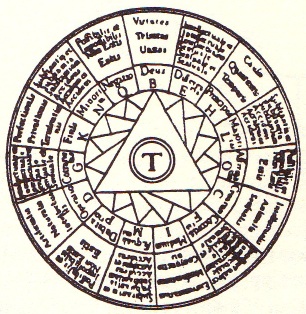
]... enclosed 5 triangles in a circumference of 15 compartments ....
[ To find out how the remaining 28 - 12 = 16 generators of Spin(8) work, consider that they correspond to 16-dimensional U(2,2) = U(1) x SU(2,2).Use the U(1) to describe propagator phase, and look at the remaining 15 generators, which correpsond to SU(2,2) = Spin(2,4), the Conformal Lie algebra that gives the Higgs mechanism plus Gravity by a generalized MacDowell-Mansouri mechanism and the U(1) gives propagator phase.
Thus, through wheel S and wheel T, Lull shows how the Standard Model (including Higgs) and Gravity work after dimensional reduction of octonionic 8-dim spacetime to quaternionic 4-dim physical spacetime plus 4-dim internal symmetry space.
Note that the 5 triangles correspond to the pentagonal vertex figure of the icosahedron, which is related by Fuller tensegrity transformation
to the cuboctahedron which is the root vector polytope of Spin(2,4), the bivector algebra of the Cl(6) subalgebra of Cl(8), whose 15 dimensions correspond to the 15 compartments. ]
... a fourth circle ...
[ wheel V
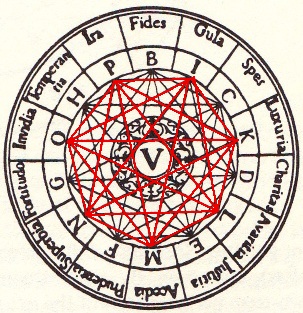
]... divided 14 compartments of its circumference between 7 virtues and 7 vices respectively rendered in blue and red ...".
[Here I have colored the wheel with black and red instead of blue and red. Compare the Heptagon of Imaginary Octonions:Note that the 14 compartments correspond to the 14 dimensions of the G2 Lie group of the automorphisms of the Octonions, and that the two 7s correspond to the two S7 7-spheres that, combined with G2, make up the 28-dimensional Lie group Spin(8) of the bivectors of Cl(8).
Note also that Lull shows 42 lines of pairs, made up of 2 sets of 21 = dim Spin(7), where one Spin(7) has the standard emebedding in Spin(8) due to S7 = Spin(8) / Spin(7) and the other Spin(7) has the Clifford embedding in Spin(8) due to S7 = Spin(7) / G2.
There are 2 Clifford embeddings of Spin(7) in Spin(8), corresponding to + and - half-spinors of Spin(8) as to which Lull's wheel X is relevant, and all 3 embeddings (1 standard and 2 Clifford ) are related by triality. See the book "Clifford Algebras and the Classical Groups (Cambridge 1995) by Ian Porteous. ]
The above images of wheels A, S, T, and V are from Martin Gardner's paper "The Ars Magna of Ramon Lull (reprinted in his book "Science: Good, Bad and Bogus (Prometheus Books 1989)) in which he says: ".. Lull's figure X
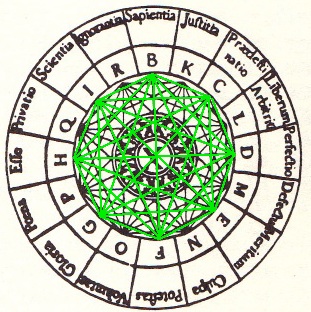
employs 8 pairs of traditionally opposed terms ... arranged in alternate blue and green compartments ...
[Here I have colored the wheel with black and green instead of blue and green. Note that the 8+8 = 16 elements set out as two sets of 8 opposed pairs corresponds to the 8 +half spinors and their mirror image 8 -half spinors of Spin(8) and Cl(8).Note also that Lull shows 56 lines of pairs, made up of 2 sets of 28 = dim Spin(8), where one Spin(8) is the bivectors of Cl(8) which act on the Cl(8) vectors of 8-dim spacetime and the other Spin(8) is the Cl(8) Hodge dual of the bivectors, and acts in momentum space.]
Figures Y and Z are undivided circles signifying, respectively, truth and falsehood. ...
[Note that Y and Z correspond to Yin and Yang, and the basic binary duality used to construct Clifford algebras including but not limited to 2^8 = 16x16 = 256-dimensional Cl(8).]
Some of... Lull's ... works are brief, popular versions for less intellectual readers ... For example, the categories of certain basic figures are reduced from 16 to 9 ... These simpler ninefold circles
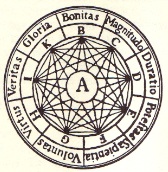
[Note that the 9 chambers combine by forming pairs to produce 36 more "chambers" corresponding to 36-dimensional adjoint representation of the Spin(9) Lie algebra, which when combined with its 8+8 = 16-dimensional representation of Spin(9), produces the 52-dimensional Lie algebra F4 whose Lie group is the automorphsim group of the 27-dimensional Jordan algebra J3(O). F4 can be regarded as a real version of the 78-dimensional Lie algebra E6.]
are the ones encountered in the writings of Bruno ... and ... in Hegel's description of the Art ...
Fifty years after Lull's death ... Dominican inquisitors ... succeeded in having Lull condemned as a heretic by a papal bull, though later church officials decided that the bull had been a forgery. Lullist schools, supported chiefly by Franciscans, flourished .... mostly in Spain but also in other parts of Europe. ... Bruno's first and last published works, as well as many in between, were devoted to ... the method, notably "The Compendious Building and Completion of the Lullian Art". ...".
According to a Tarot University ArkLetters article by Christine Payne-Towler: "... In the late 1200's, Raymond Lully perfected from this historical welter of worlds, correspondences, and entities an alphabetic synthesizing tool in the form of wheels within wheels. ... Over time Lull adjusted his invention until he had winnowed it down to the fewest movable parts holding the maximum possible meanings. ... Marsha Schuchard quotes Lull's scientific biographer F. D. Pring-Mill, who "...thus includes Lull's ars combinatoria among the forerunners of modern symbolic logic and computer science, 'with its systematically exhaustive consideration of all possible combinations of the material, reduced to a symbolic coding.'" ... the Tarot quite likely represents the next level of Lull's systematized combinatory style of thinking, only this time physically untethered from any formal organizing principle such as the wheels-within-wheels format that Lull pioneered. ...".
According to a "Magic and the Early Tarot" article by Robert O'Neill: "... The historical evidence overwhelmingly demonstrates that the Tarot was designed in the 15th century in northern Italy. The specific symbols and the number of cards appear to have evolved, starting about 1420 or even earlier. ... it is clear that there are many ties between the Tarot symbols and the magic of the 15th century. ... Lullism, etc. played an integral role in the everyday lives of the Italian city states. ... But it is important to recognize that the magic was not secret or pagan, it was Christian, public, and for the most part quite orthodox. ...".
Here is a 78-card Tarot Spread corresponding to E6 of my physics model:
8s, 8w, 8c, 8p, (neutrinos) and 0 and Qp (complexifications) are the E6 Cartan subalgebra elements.
The other 72 correspond to the 72 letters on the Urim v'Tumim breastplate.
Qp
jp 9p
jc 9c
jw Qc 9w
js 21 Qw 9s
kp 20 Qs 10p
kc 19 15 Kp 10c
kw 18 10 14 Kc 10w
ks 17 9 13 Kw 10s
1s 16 8 6 12 Ks 1c
2s 3s 7 3 5 11 2c 3c
4s 5s 2 4 4c 5c
6s 7s 1 6c 7c
8s 1w 1p 8c
2w 3w 2p 3p
4w 5w 4p 5p
6w 7w 6p 7p
8w 8p
0
8 - Sufism: Here are some correspondences between the Sufi Ideas of Ibn Arabi and D4-D5-E6-E7-E8 VoDou Physics:
The One (ahadiyah) the empty set or Absolute Unity which needs no Names
Oneness (wahidiyah) binary separation into opposites or Absolute possessing described by characteristics which are all real Clifford Algebras the Divine Names Cl(N)
thabita are archetypes structures of Cl(8) = Cl(1,7)
or fixed prototypes that are fundamental components
of all Cl(8N)
Cl(8N) = Cl(1,7) x...(Ntensors)...x Cl(1,7)
The 256 elements of Cl(8) correspond
to the 256 Odu.
The structures of Cl(8) include
+/- half-spinor fermion particles
and antiparticles
vector spacetime
bivector gauge bosons
The 256 elements of Cl(8) correspond
to the 256 Odu
mumkinat are possible things possible configurations of archetypes
forming quantum possibilities
i.e., worlds of the Many-Worlds
and Bohmian beables
qada is a decisive judgment dechoherence of a quantum superpostion
of possibilities, i.e.,
choice of which World of the Many-Worlds
at an event, or
choice made by Bohm Guiding Potential
qadar is the outcome of qada the World or State that is seen to
come into physical existence at an event
al-khalq al-jadid is the the branching of the Worlds new world that is created at of the Many-Worlds at each event the occurrence of every event
himmah is the spirtual power quantum consciousness resonant connection of an arif, or knower
taskhir bi-al-iradah is Sarfatti post-Bohm Quantum Back-Reaction constraining by will whereby a higher order constrains a lower, taskhir bi-al-hal is constraining by the state or situation in which a lower order constrains a higher, and both together form a cycle
wujudiyah is the cyclic ontology Quantum Game of Many Fates of Divine self-manifestations by new world creations
According to the book "Shards of Love" (Duke 1994) by Maria Rosa Menocal: "... "... Ibn 'Arabi and Ramon Llull lived ... from the end of the twelfth to the beginning of the fourteenth centuries. ...
the twelfth century ... provided ... a fertile base for ... the heterodox movements of kabbalists, Sufis, and varieties of Gnostics ... all at the same time in roughly the same geographical area. ... However ... a variety of repressions and isolations among the groups meant a virtually complete retreat form the various pluralisms, and it was in this reversal of climate ... that first Ibn 'Arabi and then Ramon Llull did their work. ...
Ibn 'Arabi ... born in Murcia in 1165 ... die[d] in Damascus in 1240 ... has ... been considered ... a pantheist ...
The textual similarities of Ibn 'Arabi's poetry with the poetry of the Zen tradition are striking ... Ibn 'Arabi's ... song, the most famous ... of his poems ... in the famous "pantheistic" verses toward the end ... the poet is suggesting ...
"... My heart can take on any form: a meadow for gazelles, a cloister for monks, For the idols, sacred ground, Ka'aba for the circling pilgrim, the tables of the Torah, the scrolls of the Qur'an. I profess the religion of love; wherever its caravan turns along the way, that is the belief, the faith I keep. Like bishr, Hind and her sister, love-mad Qays and the lost Layla, Mayya and her lover Ghaylan."
... that the varieties of experience of Love are not different from each other ...
Ramon Llull ...[ was in 1235 ]... born in Mallorca ... still largely populated by Muslims and Jews ...[ and ]...[ according to one account ]... in 1316 ... was stoned to death in Tunis for preaching not just conversion but a union and re-union of opposites that no one could understand anymore. ...
Llull spent the decade after his conversion becoming ... proficient in Arabic ... and its philosphical traditions ... He emerges from those ten years ... eas[ily] ... absorb[ing] and reflect[ing] ... vibrant heterodoxies of both Islam and Judaism - the Sufis and the kabbalists ... ... and sets out preaching ... his ... Ars Magna, his magical book to end all books ...[ in which ]... he expresses his belief that all reality ... is a theophany ...
Ibn 'Arabi and Llull ... the Murcian and the Mallorcan ... believed that a reconciliation between their religions was possible ... Love, to paraphrase Ibn 'Arabi, was their religion and their text. ...".
In conclusion, I quote with agreement and approval from the 2007 Edge commentary of Richard Dawkins
"… I [Richard Dawkins] am optimistic that the physicists of our species will complete Einstein's dream[ Einstein described his final theory as being "… a theorem which at present can not be based upon anything more than upon a faith in the simplicity, i.e., intelligibility, of nature: there are no arbitrary constants … that is to say, nature is so constituted that it is possible logically to lay down such strongly determined laws that within these laws only rationally completely determined constants occur (not constants, therefore, whose numerical value could be changed without destroying the theory). …".( see Wilczek's article in the Winter 2002 edition of Daedalus. )]and discover the final theory of everything before superior creatures, evolved on another world, make contact and tell us the answer.
I [Richard Dawkins] am optimistic that, although the theory of everything will bring fundamental physics to a convincing closure, the enterprise of physics itself will continue to flourish …"
and I remark that Dawkins's belief that Einstein's "cosmic religious feeling" will lead somebody (a la Newton and Kepler) to "discover the final theory of everything" shows that Einstein's religion has a purpose (i.e., our universe is not pointless) and will fulfill that purpose (i.e., religion is not merely compatible with science, but is a moving force for advancement of science).
......